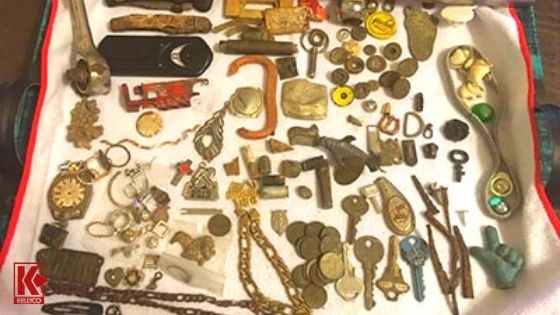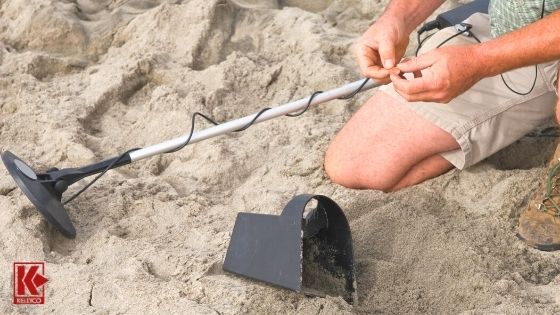Metal Detecting as a Hobby for Senior Citizens
Published by Jenna Anderson on 02/18/20

Representative Sample Of Items Found In 2019
For many people, metal detecting as a hobby goes beyond the buried treasure. It comes with physical and mental advantages that benefits people of all ages, especially senior citizens.
Imagine you’re out in a field on a beautiful, sunny day. You’ve spent a few hours in the great outdoors and you’re feeling good about life. You’re looking down at a hole you dug after your metal detector told you there was something special just a few inches below the surface.
You see something encrusted with dirt and you get butterflies. Is it valuable? Or is it junk?
You brush it off and your heart skips a beat. It’s not junk. It’s a 17th century colonial brass leather horse tack adornment, a small but exciting piece of history that, other than a little bit of rust, hasn’t been disturbed or seen in centuries.
Metal detecting as a hobby for senior citizens is a fantastic choice because it combines learning new skills, exercise and getting out in the great outdoors. It’s also an opportunity to socialize by joining clubs or participating in group treasure hunts.
Just because you’re of a certain age doesn’t mean you have to slow down. In fact, studies have shown that learning new things is key to staying sharp!
How to Get Started Metal Detecting
Metal detecting for senior citizens is pretty straight forward. It’s an exciting way to find buried items like gold, jewelry and coins, bullet casings, historic items, and anything else made of metal.
To get started, think about your goal. If you want to find gold, you’ll need a different metal detector that is made for gold prospecting than you would for relics (which are items like Civil War memorabilia). Some metal detectors are all-purpose detectors and have settings that work for everything, but others are more specialized.
If you’re just starting out and don’t want to spend a lot of money, check out Kellyco’s Guide to Cheap Metal Detectors. If you’re not sure what you want to hunt for, select an all-purpose machine.
You can purchase an easy-to-use, high performing detector for an average cost of $250.
You don’t need an enormous collection of gear, but having the following accessories and supplies will help:
- Knee pads
- Digging tools
- A pinpointer (this helps you hone in on your target)
- Anything else you would bring for a day outdoors, including a water bottle, bug spray and sunscreen
Benefits of Metal Detecting
Exercise and Fitness

Metal Detecting Involves A Lot Of Walking
Metal detecting as a hobby isn’t extremely strenuous, but it does involve a lot of walking, bending and digging. But, unlike walking on a treadmill or on a track, this walking has a purpose: finding treasure!
Susie Martin, a resident of a senior living complex in south Georgia, began metal detecting after her best friend passed away. The pair had planned to start metal detecting together, and when he passed away unexpectedly, it took her a long time to even want to leave the house.
Knowing that Susie was struggling, her sister sent her a Bounty Hunter metal detector in the mail.
It was exactly what she needed to move forward with her life.
Susie said she realized that her friend wouldn’t want her to stop living simply because he had. So, she got out her detector and hit the trails.
“A lot of it is just getting up and moving around,” she said. “There are so many people here that never leave their apartments. If they do, it’s to sit on the porch or check their mail. There are activities available to us, but most of them are boring.”
She said that many activities planned are for an older generation.
“A lot of us now are people that grew up in the 60s,” she said.
The activities are often just “busy work,” according to Susie. Even the music played is geared toward an older generation. These aren’t Guy Lombardo fans — Susie personally prefers the Rolling Stones and ? and the Mysterians.
Metal detecting as a hobby for senior citizens is an activity that Susie recommends for all seniors. There is a walking path at her complex, and she’s been successful at getting friends out detecting with her.
Curiosity can get you walking a whole lot further than you planned, according to Susie. Once you dig up that first interesting find, you’ll be hooked. If you find that your arms get tired from swinging a metal detector back and forth over the ground, harnesses are available to help distribute the weight. Susie uses the Nokta Makro Simplex because it’s lightweight and well balanced.
A good digging tool will help you get through the roots and rocks more efficiently and with less effort. Invest in a shovel or trowel that’s designed for metal detectorists.
The amount of exertion and time you put into metal detecting is up to you. You can start slow and build up to a longer day out.
“If you can’t bend down to dig up your finds, bring your grandkids with you!” Susie says. “I have multiple disabilities and arthritis, but doctors have told me that the more you move, the less those problems bother you.”
She brings a small camp stool with her so that she can sit to dig when she gets tired. That way she doesn’t strain her back or hurt her knees.
It’s not just your body that benefits from this hobby. Learning new things can lower the risk of dementia as you age. New experiences animate neuron receptors in the brain and prevents cognitive decline, according to UC Irvine researchers.
Social Interaction

Social Interaction
Avoiding social isolation plays a big part in the overall health and wellbeing for seniors, according to the Elder Care Alliance. Social support can ward off depression, anxiety, and even physical decline. It can be hard to make friends at any age. But it’s so important.
Many people in their later years of life have lost friends, spouses or life partners. Family members often move away, and work relationships are no longer there. There’s no denying it can get lonely. So how does someone make friends?
Just like kids make friends when they join a team or other group activity, senior citizens can make friends by doing the same. Metal detecting clubs are full of people passionate about what they do, and they’re always looking for more people to join. It’s a great way to learn more about the hobby and to learn from people who already know what they’re doing.
Susie says that her neighbors see her coming now.
“They always want to see what I’ve found,” she said.
She’s also connected with online detecting groups.
“For seniors that have taken up metal detecting, they have a sense of belonging to a community again,” she said. “And, it gives you bragging rights at Bingo!”
Susie started her own YouTube channel called It’sSusieQue96, which has increased her community even more. She’s passionate about getting seniors and disabled folks out there and living life to its fullest.
As a metal detectorist, you can even join groups that travel. Sal’s History Hunts, for example, brings together metal detecting enthusiasts from all over the country to explore different sites together.
Best Places to Metal Detect

Beach Hunting
The beach, a park, the woods, old homesteads, creeks — the places you can metal detect are unlimited. Be sure to ask for permission before metal detecting on private land, and check the laws about detecting on federally owned land. Use a smartphone app, like onX Maps, to discover property boundaries, names of property owners, trails and roads, and satellite and topographical imagery.
There’s a wide variety of treasure you can find. If you’re looking for gold, check out creeks, particularly out west. You’ll want a detector designed for gold hunting. If you’re more interested in finding relics, like brass buckles from the Civil War period or old bullet casings, visit old homesteads (with permission).
Just visiting new places and seeing new sights helps build those neurons that keep your brain healthy and sharp.
Susie said she met someone once while detecting who is in a wheelchair, but still metal detects with the help of his service dog.
“He makes the finds, and he trained the dog to dig it up!” she said.
He had a scoop digging tool and pinpointer adapted with long handles, according to Susie.
“He trained his service dog to dig where he pinpointed – he would then remove soil with the scoop and find the treasure, then put the soil back into the hole with the scoop and tamp it down,” she explained. “The hard part, the actual digging, was being done by his dog.”
It gets him outside and helps him embrace life, rather than sitting home alone, Susie said.
Final Word on Metal Detecting for Senior Citizens
Metal detecting as a hobby has a lot to offer senior citizens. You’ll get outside more often, get some exercise, and learn a new skill all at the same time. Your body and brain will thank you! It’s a hobby that’s shared by tens of thousands of people across the country, so it’s an easy way to build camaraderie and expand your social network.
It can take a little bit of time for newbies to figure out the metal detecting terminology. Save yourself some time and check out our guide to the best metal detectors of the year.
Don’t worry, you don’t need to know everything to get started. Most metal detectors feature turn-on-and-go functionality. Start simple, and gradually learn all the different modes, settings and jargon. Some of the easiest and most affordable metal detectors to get started on are the Minelab Vanquish and the Nokta Makro Simplex. Both these models feature the latest metal detecting technology. They’re also both lightweight, which is great if you’re concerned about physical exertion. If you want to talk to somebody about getting started, give us a call at 1-855-721-7699.
Dedicated to the memory of Florida race car driver and fabricator Thomas E White, 1959-2019.
